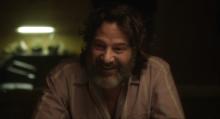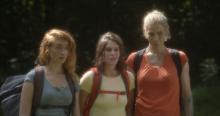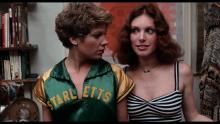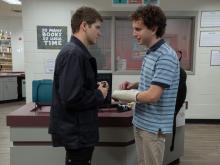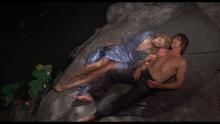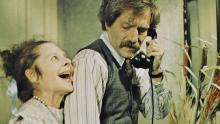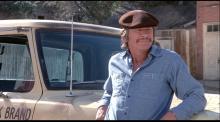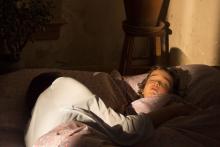This essay on Brandon Colvin's A Dim Valley was written by Zachary Zahos, PhD Candidate in the Department of Communication Arts at UW Madison. Brandon Colvin will appear in person at the October 23 screening of A Dim Valley at the Cinematheque's regular venue, 4070 Vilas Hall, 821 University Avenue. Admission is free!
By Zachary Zahos
For his third feature, Brandon Colvin has created, with his close-knit team of collaborators, a magnetic, moving, and above all, remarkably sui generis work. The major beats of the plot are clear and unchallenging to repeat: a professor and two graduate students encounter a trio of dryads, or wood nymphs, in the Kentucky wilderness, to lifechanging effect. But the road between cause and effect affords a multitude of bypaths, points of entry, and spots of stunning view. Promoted as “part hilarious stoner comedy and part transcendental meditation on mysticism and love,” A Dim Valley fulfills both of these functions and more, committed it is to genre play and tonal polyvalence, aimed most precisely to the body and, in it, the heart. A film of lingering, bespoke import, whose connotations become less easily identifiable the more you dwell on them, A Dim Valley is also, most immediately, a very funny and sensual viewing experience. Its on-screen action and off-screen meanings revolve around human connection — to one another, through our eyes, voices, and bodies; to the natural world, filled with lichens, singing cicadas, and lapping water; and to some higher power, whose presence in these characters’ lives is most synonymous with the aesthetic.
Filmed in and around Morehead, Kentucky, Colvin’s hometown, A Dim Valley achieves its dreamy effects in part through a novel synthesis of setting, cast, and scenario. Robert Longstreet stars as Clarence, a biology professor devoted to liquor as much as his beloved Appalachian mosses and butterflies at the film’s start. With him in a rural cabin, grad students Ian (Zach Weintraub) and Albert (Whitmer Thomas) collect samples while maintaining a willful distance — though it is clear that Ian has a crush on Albert when he eyes him changing, occasion for the first of several Whitmer Thomas butt shots. Three backpackers, Iris (Rosalie Lowe), Rose (Rachel McKeon), and Reed (Feathers Wise), appear before Albert one morning, and it is quickly, memorably established that they possess some supernatural power. The reason for their appearance is not even initially clear to the dryads, but as the film progresses, the connections, both temperamental and spiritual, between the three nymphs and the three men become more finely etched and gently consequential.
Unlike most other American independent films of its budget or moment, A Dim Valley focuses intently on the ambivalence, beauty, and singularity of the human face. Over 90 minutes, Colvin and cinematographer Cody Duncum toss off countless immaculately lit, iconic close-ups, all of arresting impact. Three suspended, frontal close-ups announce the nocturnal advent of the dryads, each a perfect distillation of Lowe, McKeon, and Wise’s performances. Soon after, a beautiful, tight profile view of Clarence at a bar captures a complicated moment of disbelief and regret. Longstreet should prove a familiar face at this point in his career: he has supporting roles in so many films, from Sorry to Bother You (2018) to Aquaman (2018) to Halloween Kills (2021), and he is a favorite of Mike Flanagan, most recently in Doctor Sleep (2019) and Midnight Mass (2021). Longstreet led Colvin’s previous feature Sabbatical (2014), which explored his sculptural and even grotesque dimensions. A Dim Valley is in large part the story of Clarence’s transformation, and Longstreet channels a spectrum of human feeling to get us there. His mid-film monologue, in which he relates a painful childhood dream involving fairies, taps briefly and powerfully into a well of raw sensitivity, though if pressed to pick a favorite scene, I would choose his acoustic performance of “Bison,” a Neil Young-esque number Longstreet himself wrote. Clarence’s scenes with Ian are also subtle and poignant: both characters are gay and seemingly celibate, and through body language and glances, they skirt around some sort of mutual, mirrored understanding.
In a sweet, key scene involving Scrabble, Ian plays one of the supreme words, “syzygy,” flummoxing Iris. Syzygy refers to those fleeting celestial occurrences, whereby the sun, Earth, and moon align to create an eclipse — more generally, it can denote a meeting of corresponding or contrasting phenomena. The certifiably smart Colvin (UW-Madison, PhD, 2018) invokes the word with intention, for it summarizes the film’s plot, and irreducibility, in miniature. Stepping back, the word could also apply to A Dim Valley’s brief and meaningful production, with its necessary impermanence, clashing signifiers, and monumental results. In this instance, a cast and crew of 25 convened in the summer of 2018 in splendid eastern Kentucky, a region ignored by Hollywood cameras. Virtually everyone in the crew was a filmmaker in their own right, from producer and art director Nora Stone, to producers and editors Pisie Hochheim and Tony Oswald, who — as it happens — directed a fantastic short film, Great Light (2018, produced by Colvin), which was literally shot during a total solar eclipse. I’m tempted to look at all these correspondences and call A Dim Valley “the syzygy to end all syzygies,” but that wouldn’t sell any more copies, and thankfully, the planets keep on turning.

